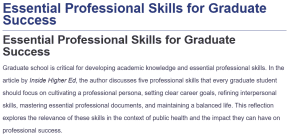Essential Professional Skills for Graduate Success
Graduate school is critical for developing academic knowledge and essential professional skills. In the article by Inside Higher Ed, the author discusses five professional skills that every graduate student should focus on cultivating a professional persona, setting clear career goals, refining interpersonal skills, mastering essential professional documents, and maintaining a balanced life. This reflection explores the relevance of these skills in the context of public health and the impact they can have on professional success.
Cultivating a Professional Persona
One of the key points raised in the article is the importance of cultivating a professional persona. In public health, engaging with community partners requires more than academic knowledge. Graduate students must present themselves professionally in all interactions, especially when working with vulnerable populations. This means dressing appropriately, communicating clearly, and maintaining a respectful demeanor. This professionalism also extends to demonstrating ethical behavior, particularly in public health, where critical issues like health disparities and promoting well-being are addressed (Sadeghi Avval Shahr et al., 2019).
Setting Clear Career Goals
The second skill highlighted is the need for students to set clear career goals. Graduate school is not only about acquiring knowledge but also about shaping one’s future career. The article, therefore, provokes the students to act wisely in devising their career plans, especially the long-term goals. This advice makes great sense to me because having a roadmap can keep one’s goal in sight and fully capitalize on opportunities within graduate school. In public health, for instance, having an aim will dictate the courses, internships, and how to establish a network.
Refining Interpersonal Skills
Interpersonal skills are another crucial aspect of professional development discussed in the article. Students pursuing graduate degrees must interact with various stakeholders: fellow students, instructors, community members, and public health personnel. In those interactions, communication, collaboration, or cooperation plays a significant or crucial role in delivering goods and services. Thus, interpersonal skills are beneficial for cooperation with peers during group assignments and for developing various working relationships. Since public health revolves around people, I am a very good candidate for the job as I can listen to people, feel for them, and even talk to them (Beenen et al., 2023).
Mastering Essential Professional Documents
Another important skill is creating and maintaining professional documents, such as resumes, CVs, and cover letters. In the competitive job market, these documents are usually the first time a prospective employer interacts with a candidate. The article also emphasizes the preparation of neat and accurate documents containing details of the experience and talents of the individual. This is more or less true, especially for those who want to work in the public health setting, given that there are many applicants despite the limited vacancies nationwide. CV or resume papers that are well formatted and highlight all the experience and knowledge of the candidate can be a huge plus when it comes to the issue of an interview or a job offer.
Maintaining Balance
Finally, the article emphasizes students’ need to balance their academic and personal lives. Graduate school may be stressful due to the challenges of performing well in class work, research, and internships. It’s easy to get carried away with these aspirations, but excess is poison. Therefore, it’s always necessary to maintain self-control. One of the things that I have learned is that it is important to draw some lines and free some time for oneself to handle stress levels. In a field such as public health, characterized by burnout, it is important to pay attention to a person’s physical and mental health.
In conclusion, the insights provided in the Inside Higher Ed article on professional skills are valuable for graduate students across all disciplines, including public health. Professionalism, career enhancement, communication, documentation, and work-life balance help students prepare for success during and after graduate school. Thus, these skills not only contribute to academic outcomes but also positively impact public health and career satisfaction.
References
Beenen, G., Fiori, M., Pichler, S., & Riggio, R. (2023). Editorial: Interpersonal skills: Individual, social, and technological implications. Frontiers in Psychology, 14(78). https://doi.org/10.3389/fpsyg.2023.1209508
Sadeghi Avval Shahr, H., Yazdani, S., & Afshar, L. (2019). Professional socialization: an analytical definition. Journal of Medical Ethics and History of Medicine, 12(17). https://doi.org/10.18502/jmehm.v12i17.2016
ORDER A PLAGIARISM-FREE PAPER HERE
We’ll write everything from scratch
Question 
Assignment #9 (30 points)
PH 600
Graduate school provides an opportunity to not only gain knowledge but to engage in professional development. For those of you in our MPH program, you will complete service hours with a community organization for your public health practicum. For those in other degree programs, you may have similar internship or service experiences.
When engaging with community partners and within a graduate degree program, professionalism is paramount.
For this week’s assignment, read this Inside Higher Ed article on professional skills. Write a 500-word reflection on your thoughts, opinions, and reactions to this guidance.

Essential Professional Skills for Graduate Success